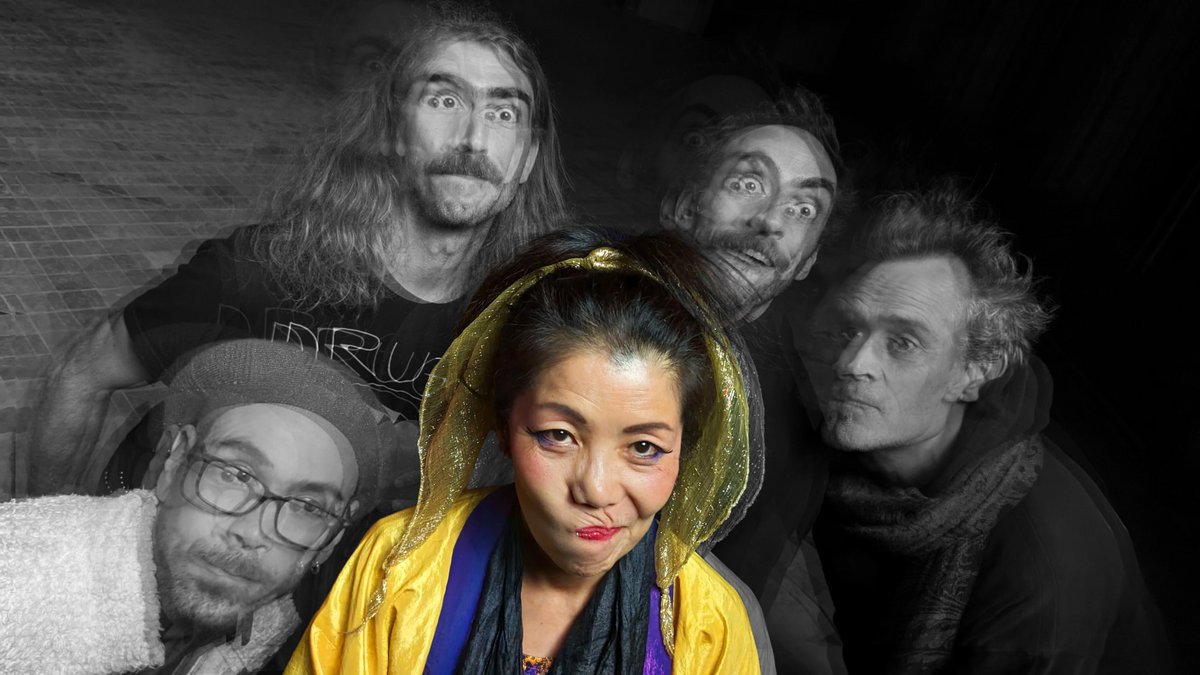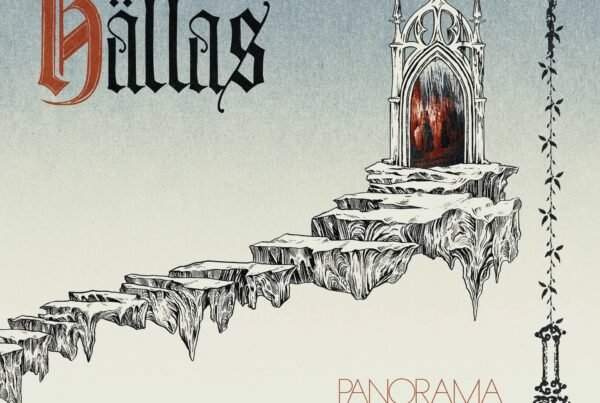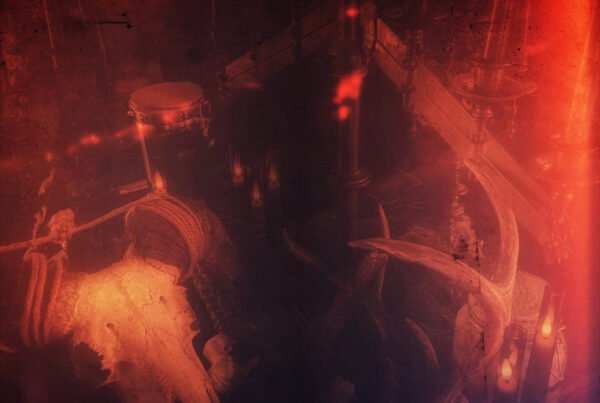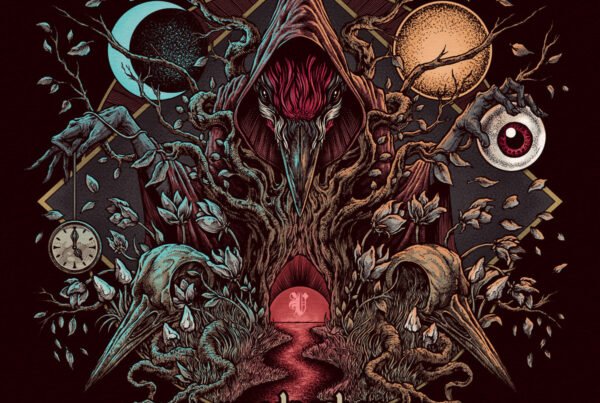PoiL Ueda will teleport you to a different universe with Yoshitsune. There’s no time to explain, I am pressing the play button now.
Release date: November 3, 2023 | Dur et Doux | Bandcamp | Spotify
Imagine that I am screaming, at the top of my lungs, yet very enthusiastically, the following sentence: ‘Have you heard of PoiL?!’. That’s a rhetoric question, I’ll tell you what’s up anyway. PoiL is just one of those bands which hear about ridiculous things such as ‘limits’, ‘boundaries’, and ‘rules’ and laugh them out of the room with utter dismissal. This is the type of band which truly believes in music as a language, but as a programming language of sorts, rather than a spoken language. I mean that in the sense that, they will write whatever scripts they deem necessary, to achieve their wildest dreams.
PoiL have been on my radar ever since they released Sus. The album got a lot of traction and hype in niche circles where I spend time, especially between my colleagues here at EIN. I didn’t particularly like Sus (still don’t), however, I figured at the time that it shows a lot of potential and it’s worth seeing what happens next. Damn did that line of thought pay off thousand-fold. If this thought would’ve been a stock investment, I would’ve been a billionaire or something. This is where I would make a long-winded argument, that this is the superior outcome, because the world of music is forever enriched by what came after Sus and the total happiness in the world increased. My point is that it would be cool if I was rich, but this is cool too.
Enter Junko Ueda, probably the last person anyone would’ve ever thought would collaborate with PoiL. In hindsight, it makes perfect sense, but on paper, with no ‘proof of concept’ it just sounds insane. I’m not exactly sure what the timeline is here, but I first recall hearing the “Dan No Ura” suite at the beginning of November 2021. I talked a little about the “Kokô 虎口” suite here shortly after that. Back in March the PoiL Ueda unit released what was to be the first album in a series, simply named after them. Recently we were greeted with Yoshitsune. I’ll have to begin with a few words about the first album, as they’re both part of the same pocket universe, although, not before introducing the other part of this unit.
Junko Ueda, is, for the lack of any better words, a wizard. Now, you might smile and think that I’m just being flattering or something of the sort. No. There is literally no other way to describe Ueda’s level of artistic talent, than claiming she is, for all intents and purposes, a person capable of magic, due to how she manipulates our emotions via art. Her talents can’t be appropriately summed in a few words, so, peruse, at your leisure her background here.
Poil/Ueda sets the tone for the world we are going to step into. It’s a surreal, arcane, and highly dramatic ancient medieval future. Yes, I’m aware those words don’t make a lot of sense strung together, bear with me. The record commences with the lingering and resonating “Kujô-Shakujô” suite, a Buddhist shômyô chant employed by monks to repel malevolent spirits. In the wake of this otherworldly introduction the record spends the rest of its time delving into the tumultuous naval clash of Dan no Ura, named aptly “Dan no Ura” and split into two songs, recounting the sorrowful downfall of the Imperial Heike clan in their fateful encounter against the formidable Genji clan.
Yoshitsune though, takes a more concrete and detailed approach to storytelling in order to continue immersing us in this world. As the name implies, it follows the life of Minamoto no Yoshitsune, a legendary samurai warrior from medieval Japan. More specifically, as it is illustrated in the Heike Monogatari (平家物語). Ueda’s contribution to the unfolding of this narrative is, obviously quintessential, given her background and her level of performance with shômyô and the satsuma-biwa. On Yoshitsune, as on the eponymous debut, her vocal performance is outstandingly evocative, stark, and deeply nuanced. It’s the type of performance that lingers, slowly seeping into your soul, long after even the final notes of the album have faded away. Her unnerving conviction in the delivery of each line, rings with the kind of power that you’d describe a superhuman with. Retaining the proportions and the specifics, the same can be said about her indelible performance with the biwa.
The music itself, as Ueda’s esoteric sonic footprint coalesces with PoiL’s fiercely modern progressive fusion hallmark, is nothing short of monumental. I really think these people, as a single unit, managed to equate their intent and narrative into sound perfectly – a legend. It’s difficult to capture in words, however, take a moment and conjure what you think, has to be the most amazing event ever. If it didn’t happen, imagine that hypothetical instead. Now imagine, not just being a witness to that, but being the main character in that legendary event, experiencing the pure might and weight of it all firsthand, in every particle of your body and soul. Good, now imagine that it was captured in the form of sounds. I don’t even feel that it’s a metaphor, or an exaggeration when I say that, when listening to this music, it feels like I’m there.
It’s not authentic in a reenactment type of manner. So, don’t think historically accurate at a sonic level. Think rather, history augmented to a previously unimaginable degree, with every artifice you can add to make everything better. You know how adding MSG to any dish or food basically makes it better (with a few rare exceptions)? That’s what the PoiL and Junko Ueda union is like for the concept of this album.
I think it’s also rather amazing how anyone could make an album which is almost obsessively specific about every little detail, which leaves so much room to the imagination. I was literally sitting in my chair, listening to the album, staring at some nondescript part of the wall and my brain was running mad with vivid, surrealist images from a world far away shifting and turning as if it is being projected in front of me. The music literally offered me so much power that I could imagine these entire intricate epics with no effort.
Knowing or not knowing the subject and the lyrics doesn’t seem to change much. On my first listens I didn’t even know much about the concept behind it all. I imagined some wild fantasy story before my eyes. On subsequent listens I delved into the concept deep (much deeper than I wanted or would have been necessary). I imagined some wild fantasy story before my eyes. Get it? Sure, you have a much more profound appreciation of it with the latter approach, but even if you know nothing about anything I talked about, if you enjoy music that’s really out there, you will enjoy this, one way or another.
I don’t know what else I can say about Yoshitsune (or PoiL/Ueda) other than the fact that it’s a masterpiece which runs the gamut from feral, primeval, haunting, and visceral, to ethereal, fantastic, oneiric, and everything in between. It’s also draining. Listening to this several times in a row is like binging on several lifetimes worth of stories. I am very much looking forward to what comes next from this illustrious ensemble, but I hope they take their time, because such things can’t be rushed and I’m also tired.






